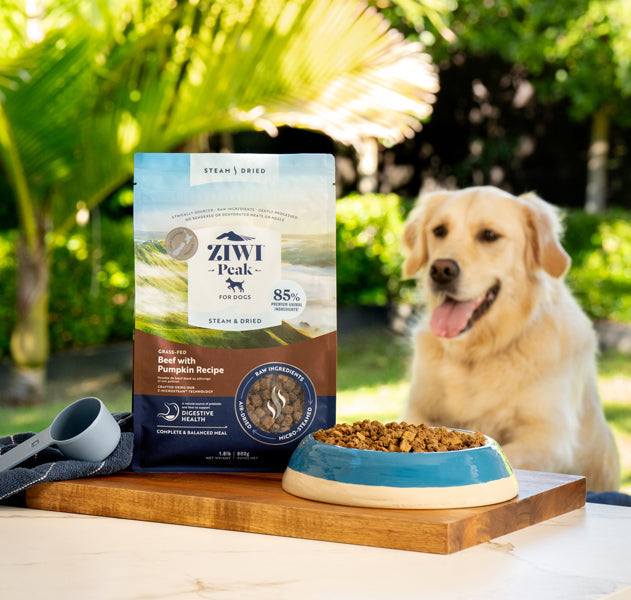
As pet parents, ensuring the well-being of your four-legged friends is a top priority. At ZIWI, we're committed to providing natural, balanced meals that help your pets thrive.
A common question we encounter is whether kale, a renowned superfood for humans, is also beneficial for dogs. Let's dive into the nutritional benefits, safety considerations, and feeding tips for incorporating kale into your dog's diet.
Is Kale Safe for Dogs?
The short answer is yes, kale can be safe and healthy for dogs in moderation. However, it’s essential to be aware of certain factors to ensure it benefits your pet without causing harm.
Potential Risks of Kale
While kale is packed with nutrients, it also contains compounds like oxalates and isothiocyanates. In large quantities, oxalates can lead to kidney and bladder stones, and isothiocyanates might cause mild gastrointestinal irritation. Therefore, it’s crucial to feed kale in appropriate amounts to avoid these potential issues.
Benefits of Kale for Dogs
Kale is a powerhouse of vitamins and minerals that can be highly beneficial for your dog’s health. Here are some key nutrients found in kale:
- Vitamins A, C, and K: Essential for maintaining healthy vision, immune function, and blood clotting.
- Calcium and Magnesium: Important for bone health and muscle function.
- Antioxidants: Help in combating free radicals and reducing inflammation.
- Fiber: Aids in digestive health and regular bowel movements.
How to Safely Prepare & Feed Kale to Dogs
To safely incorporate kale into your dog’s diet, follow these feeding tips:
- Moderation is Key: Serve kale as an occasional treat, not a staple. A small amount mixed with their regular food is sufficient.
- Proper Preparation: Thoroughly wash kale to remove any pesticides and chop it into small, manageable pieces. Remove the stems of kale before feeding as they can be a potential choking hazard for dogs.
- Cooking Kale: Steaming kale can help break down some of the fibrous content, making it easier for your dog to digest.
- Introduce Gradually: Start with a small portion to see how your dog reacts. Monitor for any signs of gastrointestinal discomfort.
- Avoid Seasonings: Serve plain kale without any added salt, spices, or oils which can be harmful to dogs.
Practical Feeding Tips
If you’re looking to enhance your dog's diet with healthy treats, consider the following tips:
-Feed ZIWI Peak Steam & Dried Lamb with Green Vegetables recipe: This recipe is crafted from ethically-sourced raw lamb from New Zealand’s green pastures with a blend of spinach, kale, green beans, and chicory root, providing your dog with even more added health benefits than what kale alone can offer.
- Mix with Regular Meals: Add a small amount of chopped or steamed kale to your dog's regular ZIWI meal. This ensures they receive the nutritional benefits without overwhelming their system.
- Homemade Treats: Incorporate kale into homemade dog treats. Combine it with other safe ingredients like pumpkin or sweet potatoes for a nutritious snack.
- Rotate Greens: Kale shouldn’t be the only green in your dog's diet. Rotate with other safe greens like spinach or green beans to provide a variety of nutrients.
Kale & Dogs – FAQ:
- How to cook kale for dogs
Wash kale thoroughly to remove pesticides, chop into small pieces, and steam it to break down fibrous content, making it more digestible for your dog.
- Is kale good for dogs
Kale is rich in vitamins and minerals beneficial for your dog’s health, including vitamins A, C, and K, calcium, magnesium, antioxidants, and fiber.
- Can dogs eat kale stems
Remove the stems of Kale before feeding as they can be a potential choking hazard for dogs.
ZIWI: Natural Nutrition for Optimal Health
At ZIWI, we believe in the power of natural, ethically sourced ingredients to nourish your pets. Our range of Air-dried, Steam & Dried and wet foods are crafted to deliver balanced nutrients, supporting your dog's overall health.
We understand that every pet is unique, and our feeding calculator can help you determine the right portion sizes based on your dog's specific needs. For personalized guidance, always consult your veterinarian, or reach out to our friendly consumer care team for help.









